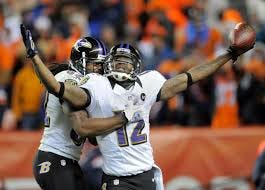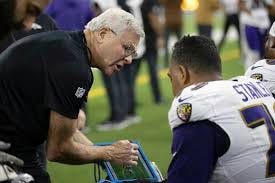Heroes, goats, slackers and stars: They're people, too
As individual athletes struggle with anonymous threats in the era of legal betting, the Ravens honor two men who couldn't be objectified.
There is laughter over the latest predicament to befall the wide, wide world of sports. It comes from two sources: Pete Rose and the assembled jockeys of thoroughbred racing.
Rose bet on baseball games in which he managed and played and was banished from the game, although he can be easily spotted somewhere off Main Street in Cooperstown, late in July.
The jockeys, no matter where or who, get an earful of bile from the railbirds every time they dismount a horse that didn’t win. There’s nobody else to blame for a bet gone wrong.
Otherwise, the mold that is corroding sports from the inside is free to attack everyone. Gambling was once forbidden from the conversation. Now it drives each sport, promises to finance it someday, and can’t be escaped. Just like those strange ne’er-do-wells at the racetrack, people bet and eventually lose, and their anger is adding one more sinister layer of pressure to Teddy Roosevelt’s sacred arena.
The latest warning came Thursday from Caroline Garcia, once the fourth-ranked woman in tennis. She lost in the first round of the U.S. Open. She then used X to reveal what’s been lurking, including “hundreds of messages,” some of which urged Garcia to commit suicide and voiced the lovely thought that “I hope your mom dies soon.”
This was not an impulsive rant after an unexpected loss. Garcia explained that she was 30 and was better equipped to handle such hate than some of tennis’ teens. “Tournaments and the sport keep partnering with betting companies, which keep attracting new people to unhealthy betting,” she wrote. “The days of cigarette brands sponsoring sports are long gone. Yet here we are promoting betting companies, which actively destroy the lives of some people. If someone decided to say these things to me in public, he could have legal issues. So why, online, are we free to do anything?”
Jessica Pegula, the American whose parents own the Buffalo Bills and Sabres, supported Garcia. “The constant death threats and family threats are normal now, win or lose,” she said.
Coco Gauff said she liberally blocks such comments. “I’m not entitled to read negative things about myself,” she explained. “Just as you’re entitled to write that, I’m entitled to block it.”
In May the NCAA reported that it found 4,000 threatening or abusive posts during its basketball tournaments, and NCAA president Charlie Baker has called for a ban on “prop bets,” the ones that put money on individual players. Women’s players received three times as many as the men. Ohio has already eliminated prop bets, but that didn’t stop the shadowy folks from harassing J.B. Bickerstaff, then the coach of the Cleveland Cavaliers. He said gamblers had gotten his phone number and were assuring him they knew where he lived. He also had felt the heat from fans after he’d pulled the starters from a blowout, because they were giving points.
Tyrese Haliburton of the Pacers isolated the feeling: “To half the world, I’m just helping them make money on DraftKings or whatever. I’m a prop.”
That is the upshot of fantasy leagues, video games and now legalized betting. Players aren’t flesh and blood anymore. They are pixels, or lines of type. This doesn’t stop the same so-called fans from begging them for autographs or wristbands. But the dehumanizing is real, and it isn’t any less real because the humans in question make enough money to support a Caribbean island.
Football is the most Stepford sport around, except for quarterbacks and various self-celebratory wide receivers, yet is the most popular, by miles. It’s where you first heard “next man up” as an operating principle. As both Van Gundys have observed during NBA telecasts, the next man isn’t as good as the one he’s replacing, otherwise he wouldn’t be the next man. But in football, replacing a player (other than QB) is like replacing a battery.
Still, the sheer demands of football, coupled with its interdependence, can create bonds that can be found nowhere else. That is why Baltimore coach Jim Harbaugh announced the other day that the Ravens’ 2024 season will be dedicated to Jacoby Jones and Joe D’Alessandris.
It’s possible that the two never knew each other. Jones played from 2007 through 2015 and was a Raven for three seasons, beginning in 2012. D’Alenssandris was there from 2017 through last season. He was 70 when he died on August 25, in the midst of training camp; he’d missed time due to what the club called “an acute illness.”
Jones passed away on July 14. At the time he was the wide receiving coach at Alabama State, and he had signed to coach an indoor team called the Beaumont (Tx.) Renegades. The cause of death was hypertensive cardiovascular disease, or the consequences of longtime high blood pressure. He was only 40.
Nobody in Baltimore will forget Jones, but the general public never got a grasp of what he did in the 2012 postseason. Down 35-28 with 46 seconds left in the Division Playoff at Denver, Joe Flacco spotted Jones running down the right sideline. Jones had pulled up slightly, figuring Flacco would go elsewhere. “Then I said, damn, he threw it,” Jones recalled.
Jones kept chugging. Denver safety Rahim Moore fell. Jones made the catch and didn’t stop running until he reached the end zone, a 70-yard bolt from the blue that is known in Baltimore as the Mile High Miracle. Baltimore tied it, then won 38-35 in overtime.
“I couldn’t believe how quiet it was when I scored,” Jones said. “It was like a rat pissing on cotton.”
Cut to the Super Bowl in New Orleans, Jones’ hometown, where Harbaugh faced a San Francisco team coached by brother Jim. Jones began the second half with a 108-yard kickoff return, still a Super Bowl record, and his third 100-yard-plus touchdown of the 2012 season. He also scored on Flacco’s 56-yard pass right before halftime, and the Ravens held on to win, 34-31, and Jones wound up on Sports Illustrated’s cover, not a bad deal for a kid who went to Southeastern Louisiana on a track scholarship and played football at Lane College.
Jones grew up in New Orleans but the family trekked to Houston after Hurricane Katrina. He was invited to leave the Houston Texans after his fumbling problems on returns. Now this.
“It was a celebration of the whole 504 area code,” said Ryan Clark, the ESPN commentator who was Jones’ teammate in Pittsburgh for a time. “He got to win the Super Bowl in the crib.”
The lights went off at one point, and when they returned, Jones was playing freeze tag with teammate Torrey Smith. The conditioning coaches preferred that Jones stretch instead. “Stretch?” he repeated. “I never stretched in my life.”
Jones was too exuberant for his own voice box. He had to dance to fully express himself. He wound up on Dancing With The Stars, in fact, but he also conducted dance-offs in the locker room. He did not disappear into a mental tunnel when the big moments came. Harbaugh remembers a game against Minnesota in which Jones was chatting with his own mother as the Vikings’ kicker neared the ball. Harbaugh began yelling, then stopped when Jones caught the kickoff and made it a touchdown.
In another room, in another time, D’Alessandris was gathering his offensive linemen. He was coaching offensive linemen every year since 1988, in colleges and three different pro leagues. He was in the NFL for 15 years, beginning in Kansas City.
D’Alessandris grew up in Aliquippa, Pa., as all OL coaches should. His father Giuseppe worked in the steel mill. Joe got a job in the tin mill as a second helper and enjoyed it. Giuseppe arranged it so Joe had to work in the blast furnace and wear an asbestos suit. Joe hated it and never returned to the mill.
“My dad was a wise man,” Joe would say later. “The steel mill ran 24 hours a day, three shifts. I never saw a dark night. It was always orange because of the blast furnace. The soot would pile up on the porch and we’d say, hey, we made money last night.”
Joe D had finished playing at Western Carolina and was getting married to Toni on June 30. Suddenly his college coach called and told him to call the coach at Livingston College in Alabama for a job interview. He had to be there July 5. He gathred all the coins he could and rang up the coach on a pay phone.
When did all this happen? Oh, between the wedding ceremony and the reception.
“We were planning a honeymoon in Maine,” D’Alessandris said. “We got there 25 years later.”
Wherever he went, D’Alessandris preached teamwork and repetition and did so emphatically. He also was in charge of Sunday morning mass at all four NFL stops. The Ravens leaned hard on their offensive line last year, and D’Alessandris was presented with a hunk of clay named Tyler Linderbaum, a first-round center from Iowa. Linderbaum made the Pro Bowl as a rookie, the fifth Raven to do so in Joe D’s room.
Nobody is naive enough to think the tough guys of the Internet can’t propel their filth into an NFL locker room. But in Baltimore, and in football, you don’t have to fight the madness alone.






Too much of my life is wrapped around sports as it is. I could never, ever make betting a part of it. As a former smoker (40 years) I wholeheartedly agree betting advertising should be legislated out. Ban it. Just like smokes. No one has the will to do it. Too much money. But that is what should be done.
This is brilliant. The real question is why mainstream media sports journalists are addressing the better plague on a regular basis.